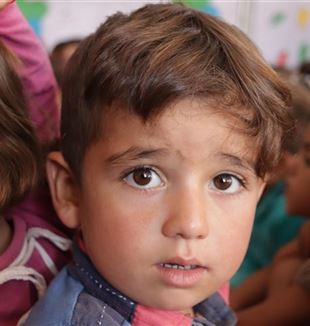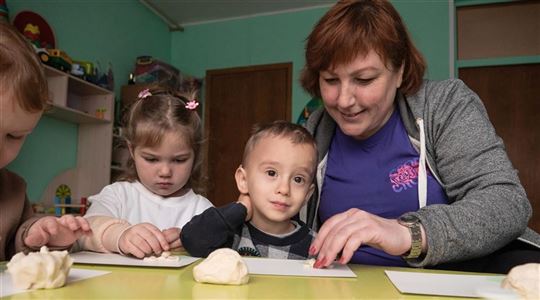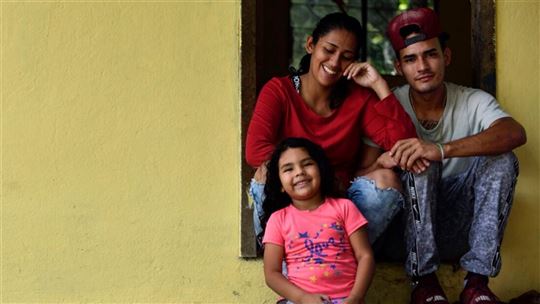
If peace has a face
Florence, Habiba, the children of Marjayoun... And a gesture that educates in charity, against addiction. Nine projects speak of how it is possible to build a new world. AVSI's Tents campaign, recounted in the December issue of Tracce.Habiba is 19 years old, has a son and a future that quickly came to a standstill when the hardship of being a single mother in the Tunis suburbs was compounded by the financial troubles of her small beauty parlour. She had decided to close everything down and emigrate. But a few days before boarding a ship, she saw her best friend die at sea, en route to Lampedusa. "She had second thoughts. She asked Caritas for help. And from there she came to us,” says Emanuele Gobbi Frattini, AVSI's manager in Tunisia: “A journey began with her, a work to improve her skills, the materials she used. Today Habiba has reopened her salon and raised her head again: she earns good money, she gives work to three other girls. And she is a good example of what it means that development, when it is true – when it makes people grow –, helps peace.
This is the word at the heart of AVSI Tents 2023, the awareness-raising and fundraising campaign that, like every year, mobilises hundreds of people, in Italy and beyond. This year’s title: "We desire peace. Let's give it a face, ours ". A way to support projects of the international organisation present in 40 countries, but also to address a question that we have all heard in recent months, in the face of the “third world war in piecemeal”: what can I do for peace?
"The Tents make it possible to collect funds for projects, of course; but they have first and foremost an educational purpose," explains Giampaolo Silvestri, AVSI Secretary General. "They serve to educate us to be open to the world, to charity, to sharing. And to make us aware of what is happening in the world.” Work that cannot be taken for granted, not even these days. We have the facts before our eyes, “but after a while the risk is addiction: today Palestine is in all the newspapers, but Ukraine has disappeared. Yet people continue to die there too. Like in Syria, which nobody talks about anymore.... Through the campaign, we would also like to inspire the ability to get moving.”
There are nine projects to be financed this year. They were chosen on the basis of urgency, but also because they “reflect our identity”, says Silvestri. “They show what we mean by ‘development’ and the growth of people is at the centre of our work. Peace starts with us, with our willingness to be open to the world and to the other, recognised as a good.”
There are, of course, the hottest fronts: Palestine, Ukraine, Lebanon. There are other places where the need has a less dramatic face, but is just as urgent: India and Ecuador, Kenya, Uganda and Italy, which welcomes migrants. And there is a country like Habiba's Tunisia, where peace hangs in the balance for so many of its inhabitants. "We are one of the places from which most migrants leave for Europe," notes Gobbi Frattini. "Of the 90,000 landed in Italy, more than 10,000 come from here. Forty per cent of the young people are unemployed. In many areas, especially in the South, not only is there no work, but there is also no reception for those arriving from sub-Saharan Africa.”
And AVSI's contribution here extends to several areas. The Tents will finance a project that will help 100 micro-entrepreneurs, to “strengthen their technical and management skills: the aim is for them to act as a driving force and create a positive spin-off.” Then, a recently established fishermen's cooperative, to transform the invasion of the blue crab (which is also rampant in these waters) from a problem into a source of wealth. And a third project, specifically for sub-Saharan migrants: “Many of them want to return home, but they need to be supported, after years of difficulties in Tunisia. We help them to train, so that they can reintegrate.”
For Gobbi Frattini, this is a good example of AVSI’s method: “You have to work on several aspects, together. And start from the positive points, trying to enhance them. You cannot help a person by just giving them money. If you do not also focus on education, the result is unimportant: when you stop accompanying them, you are back to square one.” And if you ask him where he sees the effects of this approach, he speaks of the fishermen: “Many of them have had offers to bring migrants to Italy. They would earn ten times as much. But they refused, all of them. A sign that they still have hope.”
This is something that is also needed in Lebanon, where, after October 7, there is a risk of catastrophe. "In the 15 kilometres to the north and south of the border with Israel, missiles, planes, artillery shots are coming in all the time," says Marco Perini, AVSI Regional Manager for the Middle East. "They are firing from both sides, and the impact is devastating: schools are closed, all activities are interrupted, and 26,000 people have left their homes.” This is the area of Marjayoun, where AVSI supports 1,300 children thanks to the Distance Support of Italian and other families. "We have opened a support hotline, we have social workers and psychologists who talk to the children. We are sending education kits to the homes: notebooks and books, but above all internet top-ups, because as soon as possible we will do online lessons to make up for lost months. And we prepare parcels of food, medicine, vouchers for diesel." Above all, however, they make their closeness felt. "For security reasons we cannot go there. But hearing from them every day is also important for us. Marjayoun is a historical part of AVSI. We have not only had offices and colleagues there for years, but friends, people who are fed up with this endless pressure. It is all the more reason to stay and, as we can, bear witness to a closeness that is not just ideal, but physical. It is the only way to build bridges, says Marco: “We already know the facts that divide, all of us. We build from what unites. Both the children of Marjayoun and those of Metulla, on the other side, have the desire to live in peace. Let us try to seek it together.”
And 'together' means everyone, not just those divided by a border or those working on the ground to build those bridges. But also us, here. It is no coincidence that in the Tents campaign, but not only there, one of the fils rouges linking AVSI's projects is Distance Support. It helps more than 20,000 children around the world. "For us it is one of the most significant journeys," says Silvestri: "It accompanies children to find their place in the world, but it also makes those who support them grow, because a relationship is born.
An example for all? Uganda. A country far away – thank God–- from war, but immersed in the same urgency: to generate people who give a face to another way of life. Even in extreme conditions, such as the slums of Kampala.
Emanuela Salandini has been following Distance Support in Uganda since 2005 (3,700 children helped today). "For me, it remains the most beautiful project: it concerns education, which in the end is AVSI's important theme, and it is long-term, its months are not numbered. Projects are a means, not an end. They are an opportunity to meet people and undertake a journey with them. Distance Support allows you to do that by accompanying the child for years.”
For her, she says, it has always been "an opportunity to learn: in meeting people, I discover who I am. Through the children's needs – concrete needs such as school, clothes – comes the most important need we all have: to feel loved.” To see one's own face recognised, in fact. "Development is not that you solve their problems of food or work, it is in the fact that one realises one has value. You are wanted, loved. And so you can roll up your sleeves and start to look at what is there in reality, what are the resources that allow you to do something in life. But it also applies to me: if there is no one who looks at me with this esteem, how can I look at the other person like this?"
Read also – Assisi: With new eyes
That is where peace comes from. From accompanying children and young people to discover this value, and – by doing so – from rediscovering it for themselves again and again. As happened to Florence, helped for years to bring up her children. In May her husband, Milton, was killed. He was a caretaker in a company and was shot in the head during an assault. The hospital would not even let her see him. Not out of pity: they were asking for money. Rose Busingye, the woman who has been accompanying thousands of people in the slums for thirty years to rediscover their dignity, was also furious: with the killers, with the doctors, with the blatant injustice... “Florence only asked for prayer and said: ‘I forgive them. They did this because they do not know who they are. I do know. Our body is the temple of God. I pray for them, that by discovering how precious their life is, they may understand what they did to Milton. May God convert their hearts.’ For me, peace, today, has his face.”